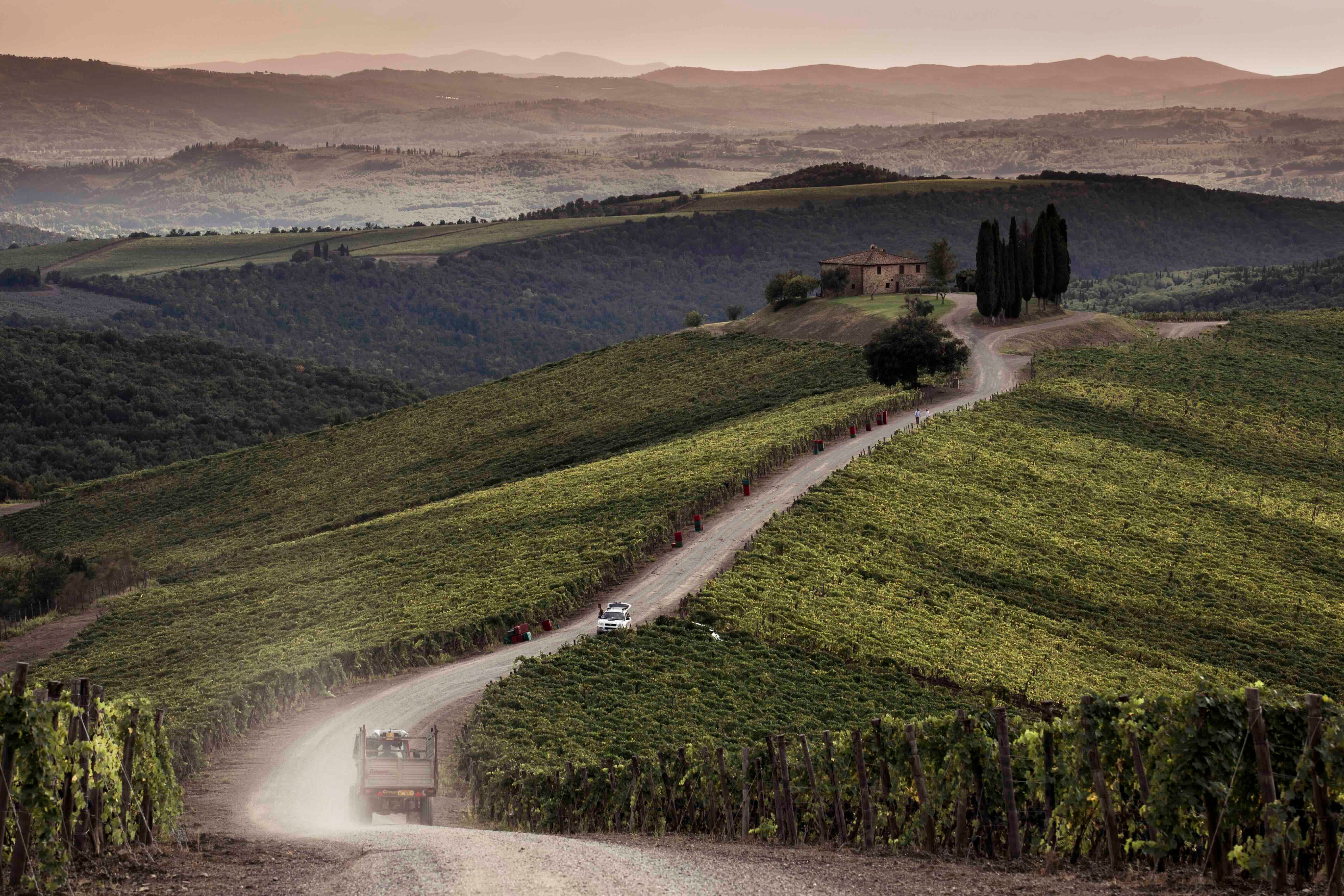As a historic producer of quality wines, how do you position yourselves in the overall landscape of fine Italian wines? What do you consider to be your main differentiating points?
As historic producers, we position ourselves in the Italian fine wine landscape as guardians of a centuries-old tradition, while always looking towards innovation and the most authentic expression of our territory. We don't just consider ourselves producers, but faithful interpreters of an exceptional terroir.
Our main differentiating point lies in our unique location and favourable climate. The Castiglion del Bosco estate stretches over an isolated and pristine area in the heart of the Brunello di Montalcino DOCG, characterised by an altitude that ensures significant day-night temperature fluctuations.
This "isolation" and altitude contribute to a cool and ventilated microclimate, ideal for slow and complete grape maturation, preserving freshness and aromatic complexity in Sangiovese. The privileged exposure of our vineyards, combined with varied and rich soils, allows Sangiovese to express all its nuances.
Tenuta Prima Pietra is in a cool, ventilated area of the Tuscan coast, at an altitude that benefits from sea breezes and excellent sun exposure. This combination of factors creates an ideal environment for the slow and gradual maturation of Bordeaux varieties, allowing them to develop complex aromatic profiles and an elegant structure, while maintaining enviable freshness.
How have you invested in the property, vineyards, and winery to differentiate your wines compared to 10 or 20 years ago?
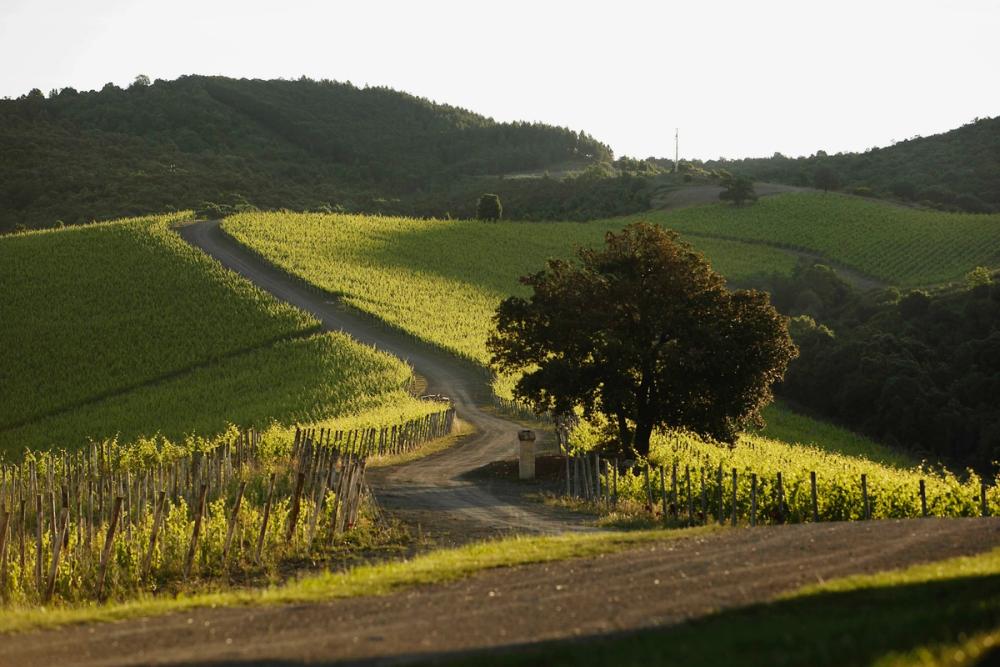
Castiglion del Bosco is committed to making the investments it needs to make wines that are sustainable and true to the vineyards they come from
Over the last 10-20 years, we have embarked on a path of targeted and continuous investments, both in the property and in the vineyards and winery, to further elevate the quality and uniqueness of our wines.
The investment at Castiglion del Bosco has focused on a continuous and meticulous process of parcel identification. We have deepened our knowledge of each individual parcel of our vineyards, analysing soil characteristics, exposure, vine age, and Sangiovese behaviour in each micro-zone.
This has led to increasingly parcelised vineyard management and separate vinifications, allowing us to enhance the distinctiveness of each individual expression of Sangiovese and create wines of greater complexity and depth. We have invested in advanced soil analysis, detailed mapping, and climate monitoring technologies to further refine our understanding of the terroir.
The investment at Tenuta Prima Pietra has been aimed at achieving the highest varietal expression. We have conducted in-depth studies and experiments on clones of Bordeaux varieties (Merlot, Cabernet Sauvignon, Cabernet Franc), selecting those that best adapt to our terroir and express the maximum qualitative potential.
This has included planting new vines with selected clones and applying specific viticultural techniques to optimiase grape maturation, aiming for a perfect balance between fruit, acidity, and tannins. The goal has always been to maximize the elegance and complexity of these varieties within the context of our unique territory.
In parallel, at both estates, we have modernised our cellars with state-of-the-art technologies that allow us even more precise control over every stage of the production process, while maintaining an artisanal approach that respects the raw material.
What changes have you made in viticulture and winemaking in the last 10 years at the two estates?
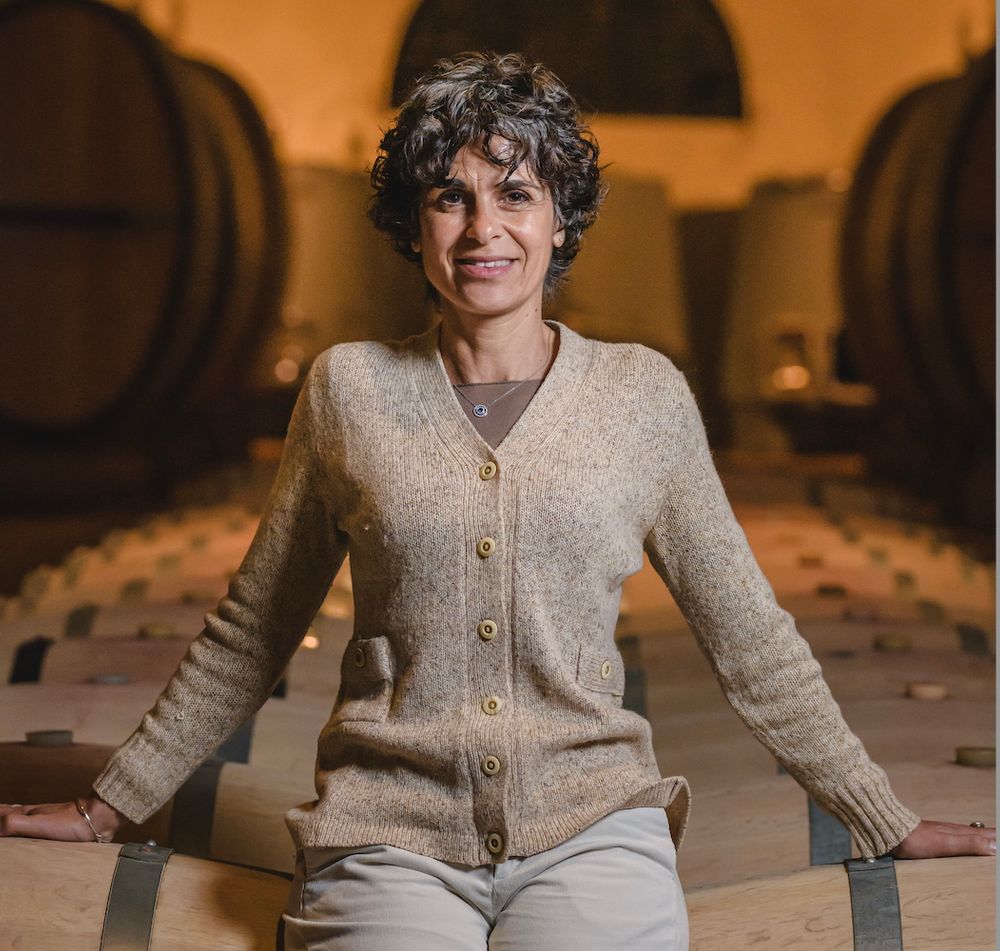
Castiglion del Bosco's chief winemaker Cecilia Leoneschi
The last 10 years have seen significant evolutions in our viticultural and enological practices, always with the aim of refining the expression of our wines.
At Castiglion del Bosco, we have significantly diversified our winemaking techniques, linking them increasingly to the different parcels identified. This has led to the implementation of whole cluster fermentations and long macerations.
For some selected parcels, we have started using a percentage of whole cluster in fermentation. This technique contributes to greater aromatic complexity, freshness, and a more elegant tannic structure, adding a herbaceous and spicy dimension that integrates perfectly with the fruit of Sangiovese.
We have deepened our studies on long macerations, adapting them to the phenolic ripeness of the grapes from each individual parcel. This allows us to best extract tannins and anthocyanins, ensuring wines of great longevity and complexity.
At Tenuta Prima Pietra, our focus has been on varietal diversification and the enhancement of varieties with great potential. This has included research and refinement of vineyard management techniques to best enhance the innate characteristics of Merlot (great softness, complexity, and aromatic richness, while maintaining the elegance that distinguishes our wines), while for Cabernet Sauvignon and Cabernet Franc, the goal has been to achieve perfect phenolic ripeness, which translates into silky tannins, intense aromas of dark fruit, and spicy notes, without ever exceeding in excessive power but aiming for harmony and finesse.
We have optimised pruning, canopy management, and cluster selection to ensure impeccable grape quality, ensuring that each variety expresses its maximum potential in our terroir.
For those who don't know you well yet, which wines would you recommend they taste first to best understand your reality and your work?
To best discover the personality of Castiglion del Bosco, we suggest tasting our Rosso di Montalcino DOC "Gauggiole". This wine is the youngest and most vibrant expression of the estate's Sangiovese. It comes from our vineyards located to the north, where clay and sandy soils, with a good presence of limestone, give the wine a distinctive minerality.
Gauggiole is a wine of great harmony, characterised by good acidity, a pleasant tannic backbone, and a perfect balance (notes of crisp red berries stand out, contributing to its freshness and liveliness). In the cellar, after fermentation, a brief passage in concrete allows us to keep the primary aromas of Sangiovese alive and intact, while increasing its harmony and complexity. It is the ideal introduction to our style and the purity of Montalcino Sangiovese.
To begin to understand the character of Tenuta Prima Pietra, we suggest the "Prima Pietra". This blend of Merlot, Cabernet Sauvignon, and Cabernet Franc is the essence of our estate on the Tuscan coast. It represents our pursuit of excellence and balance between Bordeaux varieties in a unique place. It is a wine of great structure, complexity, and longevity, which best expresses the power and elegance we seek in our wines.
When you talk to sommeliers or fine wine merchants, why do you think they should choose to include Castiglion del Bosco and Tenuta Prima Pietra over other producers?

Castiglion del Bosco works with MMD to sell its wines in the UK
When we talk to sommeliers and fine wine merchants, we highlight two aspects that make Castiglion del Bosco and Tenuta Prima Pietra an excellent choice: our recognisability and the integrity of the terroir that our wines express.
Our recognisability derives from a distinctive and consistent style: Castiglion del Bosco wines offer the fresh elegance of Montalcino Sangiovese, while Tenuta Prima Pietra wines balance power and elegance of Bordeaux varieties on the coast.
In parallel, territorial integrity is our promise of wines that are an authentic expression of the place. Each bottle tells the story of its specific terroir – be it the unique nuances of Montalcino's soils and microclimate, or the marine influence that shapes Tenuta Prima Pietra's wines. This commitment, supported by responsible agricultural practices and enology that enhances the nature of the grape, guarantees wines that are not only of high quality, but also have a true and deep story to tell.
What opportunities do you see for high-end Italian wine in the global fine wine market?
We see opportunities for high-end Italian wine, thanks to our rich biodiversity and the authenticity of our territories. However, the global market is facing significant challenges. The current economic situation in Europe, rising temperatures favouring lighter wines, and the growing trend towards non-alcoholic beverages are making the context more complex.
Despite this, we believe that our high-end wines, such as Brunello di Montalcino and Super Tuscans, continue to play a key role. Their depth, longevity, and territorial authenticity are values still highly sought after in the fine wine segment. Our strategy is to adapt to these new realities, producing wines that maintain balance and quality even in the most difficult vintages, and communicating the essence and lasting value that only great wines can offer.
A strategic element today is the position of our vineyards: high and with favourable exposure, factors that, while once considered a challenge, today (unfortunately also due to climate change) allow us to produce fresher, more elegant, and balanced wines, in line with current consumer tastes.
What characteristics and differences do you think Italy and Tuscany have compared to other countries in the international fine wine landscape?
Italy, and Tuscany in particular, stand out in the international fine wine landscape for some unique characteristics. The biodiversity of native grape varieties is unparalleled: no other country boasts such a variety of grapes capable of expressing specific territories with distinct personalities. This contrasts with countries where a few international varieties dominate, offering a wealth of sensory profiles and styles difficult to replicate.
Tuscany combines a millennia-old wine history with an iconic landscape and culture that strengthens the emotional connection with wine. Although other regions have great wines, Tuscany has managed to capture the collective imagination.
What benefits do altitude and proximity to the sea bring to Tenuta Prima Pietra and its wines?

Castiglion del Bosco believes in the power of continuous investment
The unique position of Tenuta Prima Pietra, characterised by its altitude and proximity to the sea, offers crucial benefits that are directly reflected in the quality and unique profile of our wines. The altitude ensures ideal conditions for slow and complete grape maturation in our vineyards. This gradual process allows Bordeaux varieties to fully develop their aromas and polyphenols, while preserving great elegance and maintaining excellent acidity.
These elements are fundamental for fresh, balanced wines with significant aging potential. The proximity to the sea, on the other hand, brings a beneficial marine influence. The constant ventilation from the Tyrrhenian Sea helps keep the vineyards healthy, reducing humidity and preventing diseases. At the same time, the greater solar radiation reflected from the sea surface promotes homogeneous and deep grape maturation.
This unique combination of climatic factors gives our wines remarkable aromatic and structural complexity, with Mediterranean notes that integrate perfectly with the varietal characteristics.
In summary, the harmony between altitude and sea at Tenuta Prima Pietra creates an exceptional terroir, allowing us to produce wines that are an authentic expression of this perfect balance: elegant, complex, and with a distinct personality.
What do you consider to be the most important criteria for evaluating your success compared to your competitors?
For us, success is measured through a combination of criteria that reflect our philosophy and our positioning. Scores from major wine critics are certainly important: they represent an authoritative recognition of the work done in the vineyard and in the cellar, attesting to the intrinsic quality of our wines at an international level.
Inclusion in premium restaurants and the most prestigious wine lists is a crucial indicator for us. It means that sommeliers and industry professionals recognise the value, versatility, and elegance of our wines, choosing them to accompany high-level culinary experiences. This also reflects our recognisability and the trust the marketplaces in our brand.
In addition to these, another important criterion is the loyalty of our customers and the expansion of our base of passionate consumers. The ability to create a lasting bond with those who choose our wines, perceiving their territorial integrity and our dedication, is the most authentic proof of our success.
In this sense, our 1100 Wine Club members also play a valuable role: people who choose to affiliate with our world and who, over time, become true brand ambassadors. Their enthusiasm, active participation, and spontaneous sharing of our wines with friends and enthusiasts are direct testimonies to the experiential and identity value that our wines can convey. Finally, the economic and environmental sustainability of our company, which allows us to continue investing in the terroir and quality, is a prerequisite for every other form of success.
Among your successes, what have been the most significant and important turning points?
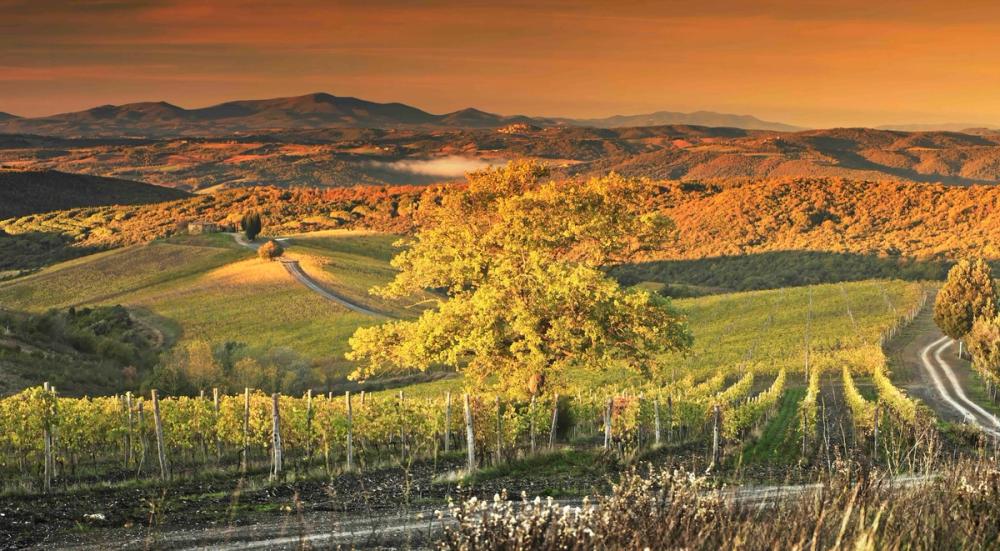
Castiglion del Bosco works hard to drive sustainability through each stage of its winemaking process
In the journey of excellence of Castiglion del Bosco and Tenuta Prima Pietra, some moments have marked a fundamental evolution, albeit with different natures for each property.
For Tenuta Prima Pietra, the most significant turning point was undoubtedly the construction of the new winery. This was not just an architectural project, but a true redefinition of our approach to winemaking. The new structure, equipped with modern technologies and designed to process grapes with the utmost delicacy and precision, has allowed us to fully express the potential of our coastal terroir. It represented a qualitative leap that enabled us to further elevate the elegance and complexity of our wines, optimising every phase of the production process and refining the expression of Bordeaux varieties in our unique environment.
For Castiglion del Bosco, on the other hand, growth is the result of constant evolution: from in-depth understanding of individual parcels to the refinement of winemaking techniques, such as the use of whole cluster or long macerations. Vineyard investments, aimed at improving grape quality and soil vitality, have also played a decisive role.
Among the agronomic practices adopted are the use of cover crops, the management of permanent grassing and cover crops to reduce evapotranspiration, and a careful observation of the vegetative cycle, intervening only when the vine requires it and not according to a standardised schedule.
We manage the canopy with careful, plant-by-plant interventions, using modern machinery to reduce the number of passes in the vineyard, thus avoiding stress and soil compaction. We carry out treatments at night to respect nature's rhythms and preserve plant health, thanks to a motivated and flexible team, capable of working according to the vineyard's timings. In summary: observation, respect, and listening are our guiding principles. This path has led us to increasingly pure, elegant, and complex wines, in a continuous quest guided by a passion for Sangiovese and respect for its territorial expression.
What are the biggest challenges you are currently facing and how are you overcoming them?
The biggest challenges we are currently facing revolve around climate and sustainability. Seasons have become increasingly complex and unpredictable, with extreme weather events putting our vineyards to the test.
To overcome these difficulties, our approach focuses on adaptability and vine stress resistance. This means investing in agronomic practices that increase plant resilience, such as targeted soil management to improve water retention, the implementation of precision irrigation systems where necessary, and the selection of Sangiovese clones and Bordeaux varieties better suited to climate change.
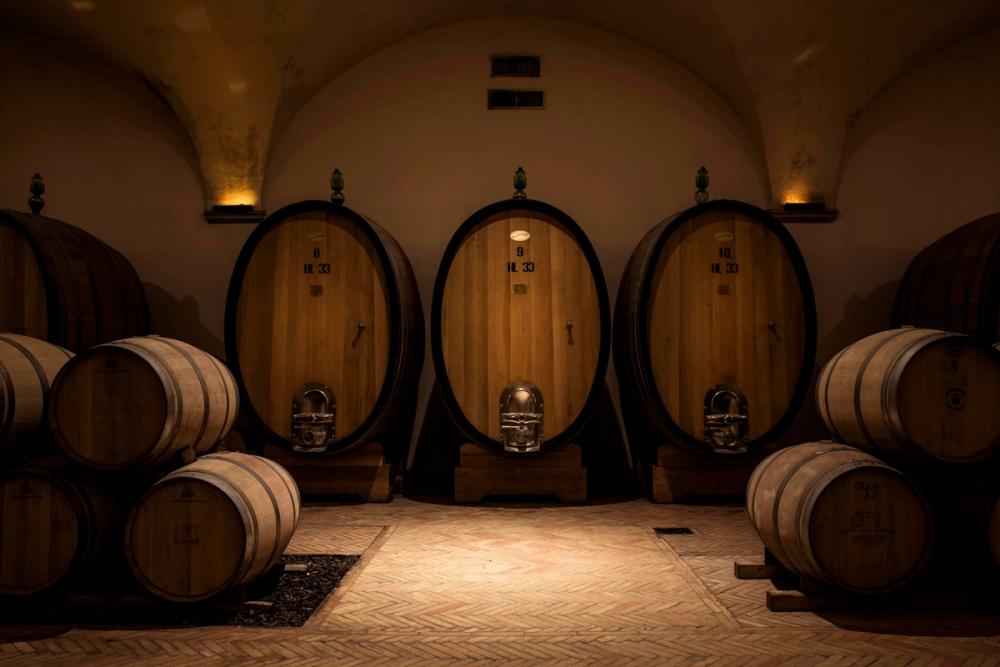
Careful ageing and handling wood is a key part of Castiglion del Bosco's approach to fine wines
We constantly work to better understand how vines respond to new conditions, refining pruning, canopy management, and harvest times, to ensure that even in the most difficult vintages, full grape ripeness can be achieved while maintaining balance and quality. Sustainability is our benchmark in this journey, guiding every choice for a future where our wines continue to be an authentic expression of their territory.
You collaborate with MMD in the UK: why did you choose to work with them? What do you think MMD offers you in the British market that other importers cannot?
We chose MMD in the UK as a strategic partner, not just as a distributor. Their deep knowledge of the British fine wine market and their established reputation were decisive. MMD has demonstrated a remarkable ability to penetrate the high-end segment, thanks to a solid network of contacts in prestigious HoReCa and among collectors, combined with impeccable professionalism and logistics.
What MMD offers us beyond that is a unique combination of specialisation and passion. They can communicate the story and philosophy of our products with authenticity. Their technical expertise and targeted positioning strategy align perfectly with our identity, guaranteeing us visibility and access to the most exclusive channels in the British market, translating into immediate credibility for our wines.
After over 10 years of collaboration, a solid personal relationship has been established, based on mutual trust and shared values. This human connection is now a significant strength that allows us to work with great synergy, flexibility, and a common vision.
How are your exports performing in other parts of the world?
Despite a period of crisis affecting the entire global wine market, and particularly the fine wine segment (as evidenced by recent reports showing declines in consumption and difficulties in international trade), our exports are proving resilient, thanks to a targeted positioning strategy.
Currently, the largest volumes and most significant growth are recorded in North America (United States and Canada) and in emerging Asian markets, particularly China and Southeast Asia.
Is there anything else you would like to add?
Yes, we would like to emphasise how our commitment is not only to producing excellent wines, but also to preserving and enhancing the landscape and biodiversity of our estates. We firmly believe that a great wine originates from a healthy and respected environment. This holistic approach, which inextricably links wine to its land of origin, is the key to our identity and a value that we seek to convey in every bottle. It is a promise of quality, authenticity, and a sustainable future for Italian wine.
* You can find out more about Castiglion del Bosco at its website here.
* Its wines are distributed by MMD in the UK.
